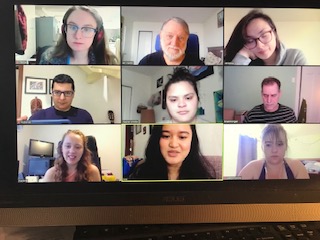In an ordinary year, the final course of Glendon College’s Certificate in the Discipline of Teaching English as an International Language (DTEIL) offers fourth-year students the opportunity to go abroad and test their skills in a foreign classroom. But, as the coronavirus pandemic raced across the globe, it quickly became obvious that spring 2020 was anything but ordinary.

Fortunately for the DTEIL students, Glendon English Department professors Ian Martin and Brian Morgan were determined to ensure their students still had a cross-cultural opportunity, even if it couldn’t take place in person. When York University decided to shut down, the professors were a month away from leading groups of students on an experiential education trip; some students were heading to a partner pedagogical university in Cuba with Martin; the others were off to our partner university in Campo Grande, Brazil with Morgan. Within days, the trips were cancelled and the professors were working their contacts to “make lemonade from lemons,” said Martin.
“We had to think quickly about how to come up with an online equivalent,” Martin explained. “Cuba doesn’t have the online infrastructure to allow us to work together remotely, but Brazil does. We contacted our partner university in Campo Grande, as well as two others in Rio and in Curitiba, to see if we could find enough opportunities for our students, and they all said, ‘Yes.’”
Prior to the start of the remote cross-cultural exchange, Martin had his class watch various recorded teaching sessions and write up their ‘noticings’ using the observation skills framework they had learned for in-person instruction. During the next five weeks, the Glendon students offered a Zoom-enabled five-session, one-and-a-half hour series of classes to around 20 graduate students in programs in applied linguistics for English Language Teaching at the two universities in Rio and Curitiba.
All students participated in the whole course, and each had a chance to host their own content – thematic modules whose content is both global and local. By the end of the experience, the students learned to exploit the full Zoom functionality: breakout sessions, shared screens and live chats. The professors added written homework (submitted via email) and pre-readings (along flipped class lines). They also kept up the weekly meetings as a class, reflecting on the week’s experience and rehearsing the class for the next week, usually with a Brazilian professor pitching in with comments.
Teaching the Campo Grande students involved an additional three-week assignment via Skype and two separate classes: one of medical students, one of future English teachers in the Faculty of Liberal Arts and Professional Studies. In working with these classes, the Glendon students followed the original in-country format: a week of classroom observation, a week of co-teaching with a local teacher and a week of teaching one’s own material.
“It was a heavy load for the students, because they had to reflect on one lesson and prepare for teaching the next,” Martin said.
Rachel Whittle, a recent Glendon graduate, was one of the student instructors. Whittle, who has an honours BA in linguistics and language studies, hopes to teach in Japan as soon as travel is safer.
“The professors encouraged us to create a lesson plan with a general theme and a global context,” Whittle said. “Mine focused on language for educational technology, something I’d originally planned to teach live, but I taught it via Zoom instead. It was challenging moving online, but delivering it that way turned out better.”
An additional challenge came from the nature of one of the Campo Grande classes: it was a course for Brazilian medical students who were learning English in order to read medical journals and research papers. It required the Glendon students to use specialized vocabulary – and so the students had a deep-end experience in teaching an English for Special Purposes (ESP) course.
Thoughtfully, the Brazilian professor chose articles about COVID-19, a topic that had relevance for both the teaching students and the medical students.
“We did a lesson plan, despite not knowing about medicine or studying ESP,” said Whittle. “It worked out really great. They were learning a new discipline – English – and we were able to teach them vocabulary for the pandemic. That was something that connected us.
“It was an experience that no one can ever take away from us, it was so unique,” she added.
Martin said it was an experience borne from the unusual circumstances of the pandemic. While the students were unable to travel, they gained valuable experience and knowledge that wouldn’t have been part of an in-person opportunity.
“Both of us professors felt it was a very positive experience overall and we were very proud of our students,” he said. “It wasn’t inferior to an in-person experience, and it was granted equivalent status by our associate principal, so the students earned their three credits for the course.
“There were also some good friendships struck up, similar to what would have happened if we’d been there. There was enough free time during the question and answer portion of each class to get to know each other.”
Martin is pleased that he and Morgan were able to find a solution for their students, pandemic notwithstanding, and sees how he might incorporate some of the positive outcomes in the future.
“This opened more doors for us in Brazil, and I think we’ll keep in touch with all three universities now, perhaps with a Globally Networked Learning project,” he said. “In addition, I will now include online teaching as part of our Glendon language-teaching methodology course – it’s going to be a useful skill for teachers in this century.”
By Elaine Smith, special contributing writer to Innovatus
